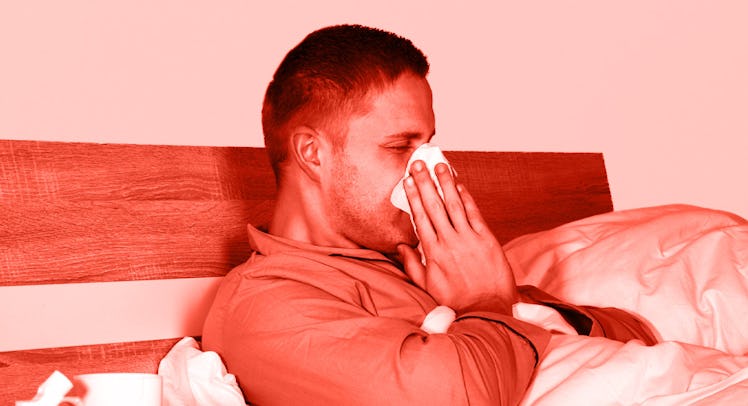You’re Not Making It Up: Parents Get Sick Way More Often
It's basic math: More kids means more germs.

In August 2009, scientists from the University of Utah began collecting diary entries devoted to the description of coughs, sneezes, diarrhea, and other symptoms of illness as well as nasal swabs from members of 26 families. For a year, they monitored parents and children for 16 different respiratory viruses. They found that young children were more likely to report symptoms and have viruses in their mucus than their older siblings. They also found that parents were more likely than non-parents to get sick.
The study, which they graciously abbreviated from “Better Identification of Germs-Longitudinal Viral Epidemiology” to “BIG-LoVE,” was published to minimal acclaim in the journal Clinical Infectious Diseases in 2015. What with the small sample size, it wasn’t big news despite marking the first deployment of a now-commonplace virus-detecting tool.
But the implications were huge. Here was something very close to confirmation of a suspicion long held by parents: What grows up must come down with highly transmissible infections. That said, nothing scientifically provable is quite so simple.
The dynamic described by BIG-LoVE, kids gets sick and comes home and gets everyone else sick, is complicated by the fact that infection and illness are not the same thing. Being infected means that a pathogen is present in someone’s system, not that they are symptomatic. As such, it seems that young children are ideal Trojan horses for viruses.
BIG-LoVE found that families without children spent four weeks out of the year with at least one person sick from a viral infection, according to the study. Adding a child to the mix made that number jumped up to 18 weeks out of the year — a 28 percent increase. That number only grew as the number of children increased. And, yes, the majority of infections were found in children under the age of 5, but the number jumped for adults as well. And neither group was reliably aware of the illnesses.
In children, some 44 percent of rhinovirus infections, the most common virus detected in the study by far, came and went without a single symptom. In adults, rhinovirus infections went undetected by 67 percent of the infected. This suggests many parents don’t just get sick more often than they did prior to having children, but also get sick more often than they think. They schlep around a viral load.
“Young children have not been exposed to as many infectious diseases, so they have not built up their immunity. So when they get infected, they’re probably going to be more symptomatic. That increases contagiousness through coughing and sneezing, they’re spreading it more,” explains Dr. Dean Blumberg, a pediatric infectious disease specialist and a spokesperson for the American Association of Pediatrics
“You may carry it, you can possibly transmit it to others, but you feel fine.”
Blumberg adds that this makes family illnesses particularly hard to study because self-reporting is critical but inadequate. Lane added that she didn’t know of any other high-quality studies that explore why parents get sick more often than non-parents, but she’s encountered plenty of somewhat speculative anecdotal explanations over time.
This is presumably why Blumberg couldn’t point to other studies. And why Dr. Chelsea Lane, a program officer at the National Institute of Allergy and Infectious Diseases, which is part of the National Institutes of Health, couldn’t either. Both commended BIG-LoVE for its methodology then pointed the finger of blame at little kids. After all, it’s a fact scientifically acknowledged that kids are gross. Exposure to all sorts of nasty bodily fluid comes with the territory of parenthood, and doctors all but guarantee that means you’ll catch something now and then.
“In my mind, the primary reason behind parents being sick more often is because they’re being directly exposed to their child’s respiratory illnesses,” says Dr. Lane.
That may be true, but data is shockingly scarce.
“Parents getting sick from their kids isn’t really something CDC tracks or has data on,” Martha Sharon, a CDC public affairs representative wrote in an email.
This means it’s unclear whether or not parents’ immune systems are actually compromised by the act of parenting or whether it’s just a matter of viral exposure. Dr. Blumberg said he was unaware of physiological changes in parents that might affect the immune system, though he speculated that the stress wouldn’t help.
Dr. Lane pointed out two key lifestyle changes that could weaken a new parent’s immune system: a lack of sleep and exercise. Neither is exclusive to parenthood but both certainly come with the territory.
Dr. Lane mentioned a 2004 review article published in the journal Nature Reviews Immunology that cited 131 studies showing that people and animals who didn’t get enough sleep had weakened immune systems, and thus were more prone to symptomatic infections. She also mentioned a chapter on exercise and immunity from the 2019 textbook “Muscle and Exercise Physiology” that made similar claims about how moderate exercise can boost immunity
“Just get more sleep” may the most frustratingly useless parenting advice in the world, but Blumberg did have some more tangible suggestions on how to keep your kids from gifting you every single germ they touch.
Both he and Lane went out of their way to bring up vaccines, which are crucial for preventing or at least weakening infections. (Go ahead stock up on elderberry syrup too, just in case). Blumberg went on to say that people tend to spend too much time cleaning their homes compared to their bodies and hands, on which germs can much more easily survive.
“I don’t have any magic suggestions,” Blumberg laughed before giving one. “Kids as young as 2 or 3 can learn to cough into their elbow rather than covering their hand.”